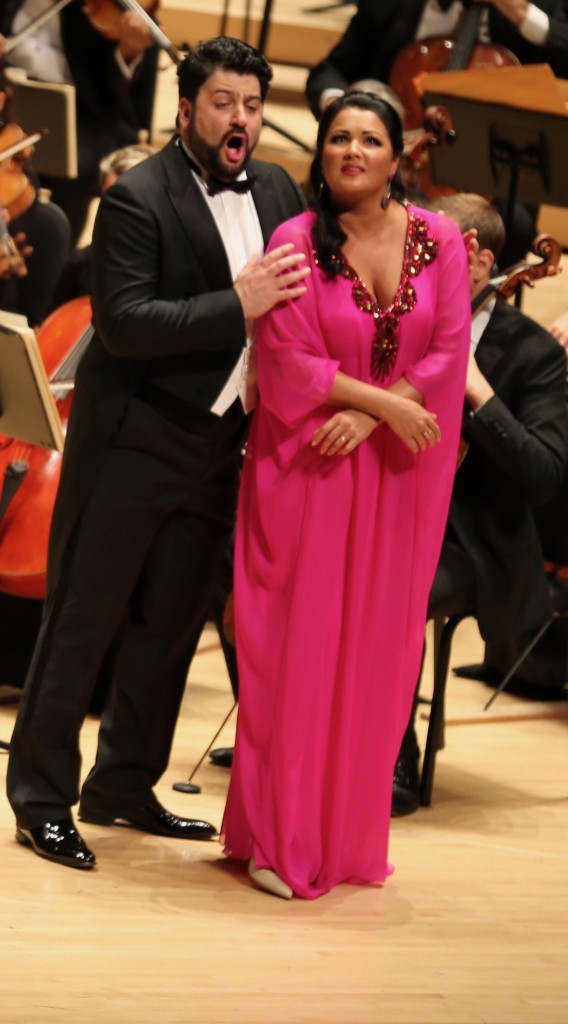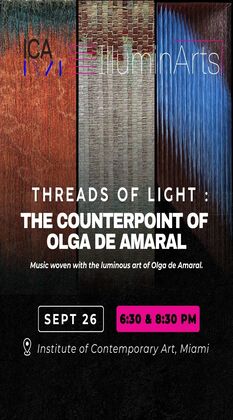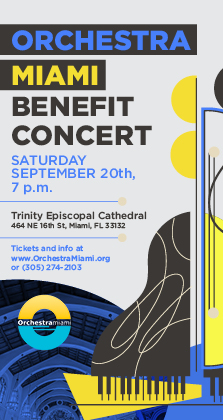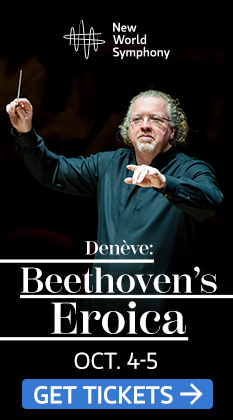Netrebko and Eyvazov bring an operatic feast to Arsht Center

Anna Netrebko and Yusif Eyvazov performed Sunday night at the Arsht Center in Miami. Photo: Bisconcert
Visceral excitement and superb vocalism took center stage at Miami’s Arsht Center Sunday night when soprano Anna Netrebko and tenor Yusif Eyvazov presented a rousing concert of opera highlights and popular Italian and Neapolitan songs. Married partners in life as well as frequent collaborators on stage, this operatic couple offered an inspired cornucopia of vocal chestnuts. The event was presented by Bisconcert.
The glamorous Netrebko has now held the stage for over a quarter-century, having made her operatic debut at St. Petersburg’s Mariinsky Theater in the early 1990’s. After early success in Russian repertoire, Mozart operas and the bel canto music of Donizetti and Bellini, Netrebko has gravitated toward Verdi and verismo heroines with Strauss’s Salome (in a joint Met-Bolshoi production) recently announced as a tantalizing future role.
Although only the “Brindisi” from La Traviata (in duet with Eyvazov) offered a glimpse of her recent Verdi triumphs, Netrebko brought the kind of full-throated passion to Italian arias that radiates fervor on both sides of the footlights. Indeed the entire concert was an unqualified love fest, between the artists and an audience dominated by many of their South Florida Russian compatriots.
Netrebko’s voice still gleams at the top and she can float a pianissimo with dulcet subtlety. Never was this more evident than in the “Song to the Moon” from Dvorák’s Rusalka, the program’s one Slavic offering. Her gorgeous flood of tone and evocative pathos encompassed a mini-drama of the water sprite’s loneliness and longing. Kneeling during the aria’s final lines, Netrebko capped a deeply moving rendition, enhanced by colorful wind and harp coloring from the players of the accompanying Orchestra Miami. Perhaps Rusalka may be on her future repertoire horizon.
In recent years Netrebko’s lower register has taken on a rich, dusky quality which was particularly effective in the verismo selections. A golden toned “Ecco, respiro appena” from Cilea’s Adriana Lecouvreur was topped by an impassioned yet subtle “Vissi d’arte” from Puccini’s Tosca in which Netrebko effectively deployed her vibrato to color the text. She brought a plethora of emotion to “Ebben! Ne andrò lontana” from Catalani’s La Wally while maintaining purity of vocal production. That she still has the coloratura chops that once made her an exciting Lucia was amply demonstrated in a supple version of Luigi Arditi’s old salon favorite “Il Bacio.”
Eyvazov was not to be outdone by his wife’s singing. He is the authentic article—a tenor with Italianate ring and thrilling high notes. His tonally sumptuous “Lamento di Frederico” from Cilea’s L’Arlesiana admirably avoided emotional excess. The darkly beautiful tone of Richard Hancock’s clarinet prefaced a lyrical and ardent “E’ lucevan le stelle” from Tosca. In “Quando le sere al placido” from Verdi’s Luisa Miller, Eyvazov’s long legato line and thrilling high register never turned to harshness. (Has anyone sung this aria more beautifully since Pavarotti in his prime?)
His voice rang the rafters in the inevitable “Nessun Dorma” from Turandot (bringing the audience to its feet) and he imbued “Torna a surriento” with the kind of authentic throb usually reserved for a native Neapolitan. In a duet version with Netrebko of “Dein ist mein ganzes herz” from Franz Lehar’s The Land of Smiles (sung in Italian), Eyvazov’s honeyed timbre suggested impressive operetta chops as well.
Aside from the Lehar and Violetta and Alfredo’s drinking song, Netrebko and Eyvazov’s duets consisted of popular Italian standards rather than operatic material. Any disappointment was quickly dispelled by the luxury of Netrebko’s velvety upper range in “Non ti scordar di me,” the couple’s gorgeous blending of timbres for Cantami and a riotous “O sole mio” in which Netrebko imitated Pavariotti’s famous Three Tenors trill to the audience’s delight.
Conductor Jader Bignamini was the evening’s real discovery. A former assistant to Riccardo Chailly at La Scala, Bignamini brought intensity and noble phrasing to the operatic excerpts while anticipating and dovetailing the singers’ every breath and turn of phrase. Under his baton, Orchestra Miami sounded twice its size with dynamic playing from all sections. The program’s orchestral interludes were not mere fillers, as they often emerge in these type of concerts, but idiomatic vignettes played at white heat.
A strong, precise brass section dominated a crisp Hungarian March from Berlioz’s Damnation of Faust. In observance of the Leonard Bernstein centennial year, the Overture to Candide radiated high spirits, the string tone plush and flute solos precise. Bignamini is a major talent and a conductor with a promising future.
While one would have liked to hear more Verdi arias and excerpts from Russian operas, this concert was memorable on its own terms. With two major league singers in peak form and a gifted operatic conductor on the podium, the two hours seemed to fly past in a feast of great vocalism.
Posted in Uncategorized
One Response to “Netrebko and Eyvazov bring an operatic feast to Arsht Center”
Leave a Comment
Mon Oct 29, 2018
at 2:17 pm
1 Comment



Posted Oct 29, 2018 at 8:57 pm by Andrew Garcia
This was an amazing concert. Best opera since Arsht Center was built.